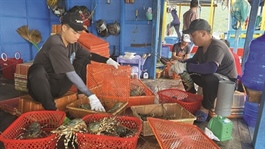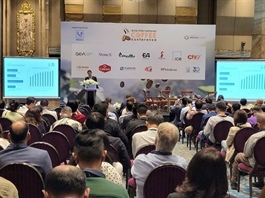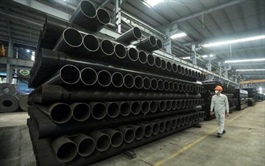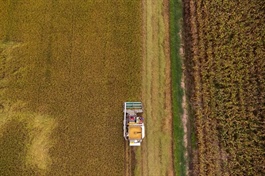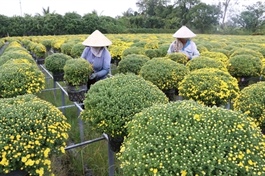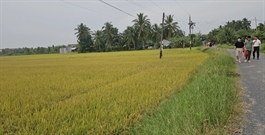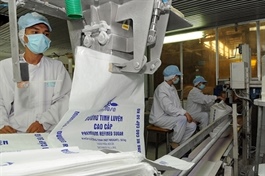Hanoi's rural district fosters large-scale pomelo production
Hanoi's rural district fosters large-scale pomelo production
There are 910 hectares of pomelo cultivation in Chuong My district, which accounts for about 13% of the total area under pomelo cultivation in Hanoi.
Chuong My District in Hanoi should continue to attract enterprises for large-scale pomelo production, ensuring adherence to the VietGAP and GlobalGAP standards while maintaining the high quality of the output.
These are the solutions to promote trade and connect pomelo consumption for Chuong My District at the related conference held this week in Hanoi.
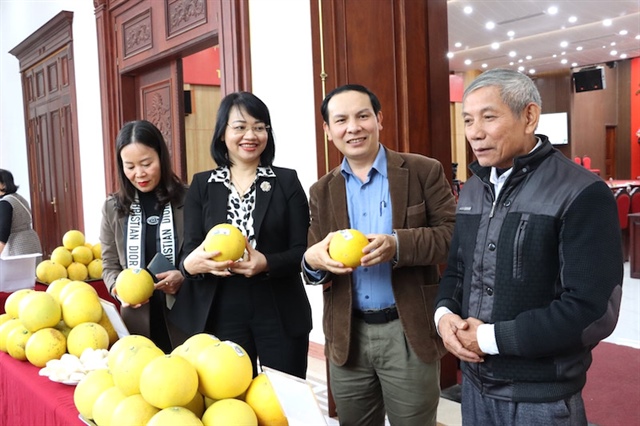
Pomelo display at the conference. Photos: VGP |
The delegates emphasized the need for the district authorities to support enterprises and cooperatives in promoting and branding pomelo and to facilitate the signing of product consumption contracts with enterprises inside and outside Hanoi.
At the event, Deputy Chairman of Chuong My District People's Committee Do Hoang Anh Chau said that in 2023, Chuong My District had 910 hectares of pomelo cultivation, accounting for about 13% of the total pomelo cultivation area in Hanoi. The expected harvest is about 14,000 tons.
The area of VietGAP-certified pomelo is 136.6 hectares, while the area of organic-certified pomelo is 5.5 hectares. In addition, the district has developed collective brands for Chuong My pomelo and Nam Phuong Tien pomelo.
The district has established 828 hectares of high-quality fruit tree production area, which includes various communes and towns, such as Nam Phuong Tien, Tan Tien, Thuy Xuan Tien, Xuan Mai (389 hectares), Van Vo and Phu Nam An (120 hectares), and Dong Lac, Tran Phu, My Luong and Huu Van (319 hectares).
However, in recent years, pomelo sales have faced difficulties due to heavy dependence on traders. The proportion of pomelo sold under purchase contracts is low, indicating a lack of sustainable linkages between production and consumption.
A representative of the Hanoi Department of Agriculture and Rural Development stated that the department will continue to devise plans for the development of pomelo production areas focusing on safety and high value, compliance with safety, VietGAP and GlobalGAP standards for domestic consumption and export, and contribute to the restructuring of agricultural production in Hanoi towards higher value-added and sustainable development.
Establishment of pomelo plantations for export
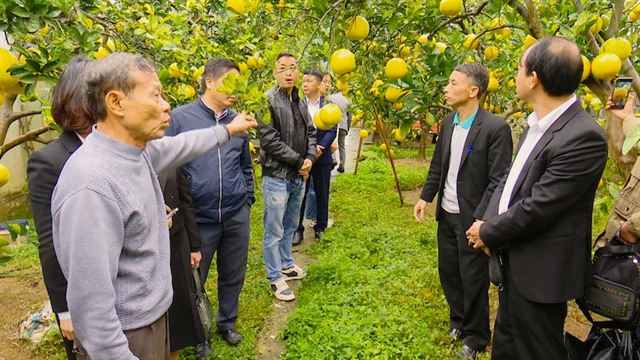
A pomelo growing area in Nam Phuong Tien commune, Chuong My district. |
Chuong My and other districts such as Phuc Tho, Dan Phuong and Phu Xuyen have a large pomelo cultivation area, with more than 7,000 hectares out of a total of 10,000 hectares, according to the Hanoi Sub-Department of Agro-Forestry and Fisheries Quality Management.
The department said that Hanoi has two pomelo cultivation areas that meet organic quality standards and the standards of challenging markets such as the US and the European Union.
Hanoi's specialty pomelo varieties have gained recognition in the US market for their exceptional quality through cooperation with the country's agricultural sector.
The capital's agricultural sector will also update information in the national database on acreage codes and packing facilities, provide training, and allocate sufficient resources to establish and manage acreage codes and packing facilities to meet regulatory requirements.
Effective monitoring and guidance will be implemented to control pests in pomelo growing areas and ensure compliance with US phytosanitary requirements. In addition, close monitoring of production records, including fertilizer application and pesticide residues, will be emphasized, the department said.
Hanoi aims to boost the establishment and management of green-skinned pomelo export cultivation zones throughout the city. This initiative aims to develop and expand safe raw material areas, meet food safety standards, enable traceability, and meet market demands.



